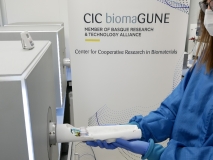The Cooperative Research Centre biomaGUNE, which specialises in biomaterials research, has just held, in September and October, the kickoff meetings for three European research projects (Horizon 2020), for which it has received a total of 1.4 million euros in funding. The three projects, which are called e-PROT, SUPRO-GEN and DNA-FAIRYLIGHTS, focus on three very different fields. According to the centre’s scientific director and Ikerbasque Professor, Luis Liz Marzán, ‘we are initiating three projects funded by an extremely competitive European call that selects only the very best proposals for implementing disruptive technologies with a sound scientific base. This approach coincides with the heart of the mission pursued by Cooperative Research Centres and confirms the prestige that CIC biomaGUNE has gained on the international scene’.
The e-PROT, SUPRO-GEN and DNA-FAIRYLIGHTS projects are based on collaboration between prestigious international research centres
Protein-based electronics
The principal aim of the e-Prot project, coordinated by Ikerbasque Professor and Scientific Co-director of CIC biomaGUNE, Aitziber López Cortajarena, is to develop a technological platform for bioinspired, sustainable and efficient protein-based bioelectronic systems as an alternative to the traditional technologies used in the electronics industry. The principal novelty offered by this project is that it ‘explores the potential of biomolecules in technological applications. In other words, it seeks to generate tools and biomaterials based on proteins for bioelectronics,’ adds Professor A. L. Cortajarena.
‘The project stems from previous basic research exploring the possible conductivity of biomolecules and the mechanisms underlying these properties. Within the project, CIC biomaGUNE is responsible for designing and producing protein molecules with optimal levels of conductivity and stability, for subsequent integration in bioelectronic devices,’ she explains. CIC biomaGUNE will then send these biomolecules to different partners to be characterised, and once the proteins with the best properties have been selected, they will be integrated into bioelectronic devices by the companies participating in the project.
Supramolecular non-viral vectors for gene therapy
The multidisciplinary and international project SUPRO-GEN, coordinated by Dr Sergio Moya from CIC biomaGUNE, aims to develop smart supramolecular carriers for gene therapy, with a view to using them to treat cancer. The project seeks to develop synthetic alternatives to the viral vectors used in gene therapy with low toxicity and high transfection efficacy (capacity to insert external genetic material into cells). In addition to coordinating the project, CIC biomaGUNE also plays ‘a key role in developing non-viral vectors for gene therapy based on polymer materials and supramolecular chemistry (the study of interactions between molecules). Our goal is to develop safe, effective alternatives to viral vectors using materials science, with the ultimate aim of using them to help treat cancer,’ explains Dr Moya.
It is important to note that ‘the project will enable PhD students from the Basque Country to engage in scientific sojourns at universities in America, Asia and Africa. We hope that this intercontinental experience will foster the intellectual and personal development of those students involved and will have a positive effect on their career prospects,’ he adds.
Mass data storage with DNA
The aim of the ambitious project DNA-FAIRYLIGHTS, in which Ikerbasque Professors Luis Liz Marzán and Aitziber López Cortajarena are participating, ‘is to implement a novel methodology that may enormously increase the data storage capacity of current devices. The methodology is based on a combination of natural DNA and different types of nanoparticles that provide very specific codes that can be used to “read” and “write” information’. The combined experience of the CIC biomaGUNE laboratories will make a key contribution to designing these codes. Moreover, the consortium includes some of Europe’s top experts in this type of technology.
CIC biomaGUNE’s role in the project will be mainly to develop a library of metallic nanoparticles and ultra-small light-emitting nanoclusters, and to ensure their controlled assembly in DNA templates. The specific optical properties of each nanomaterial will be used to mark, read and identify specific DNA sequences that encode the information, thereby enabling fast electrooptical reading of the encoded data. ‘We estimate a data storage capacity up to 100 times greater than that provided using current technologies. It is not hard to imagine the impact that this technology may have on the electronic components industry,’ concludes Liz Marzán.

